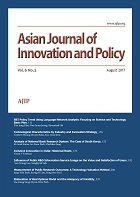 ISSN : 2287-1608
ISSN : 2287-1608
A Study on the Improvement of National R&D Project Performance Evaluation and Budgeting System
Hyungwook Sim (KISTI)
Seokki Cha
Abstract
The national R&D project is a major strategy for the development of science and technology in the country. This is promoted for the purpose of improving the welfare of the people, such as creating jobs and fostering small and medium-sized enterprises, through the results of science and technology research conducted with support from the national budget. Therefore, analysis of the performance evaluation and budgeting system of the current national R&D project is one of the essential parts of preparing a system improvement plan. This study derived improvement plans through a comparative analysis of national R&D project performance evaluation and budget systems in Korea and leading countries such as the United States and Japan. As a result, it was confirmed that it may be difficult to derive innovative research results due to the lack of sustainability and a short period of time to require quantitative performance. To overcome these difficulties, the need for system improvement as follows was suggested. First, it is necessary to enlarge and prolong national R&D projects. Second, a plan for securing sustainability is needed in consideration of the main characteristics of each research field. Finally, it is necessary to strengthen the linkage between organizations in charge of national R&D projects. And also, there is a need for a system that can continuously identify problems and improve the system. In addition, the constitutional amendment will be necessary to separate science and technology from economic development, which states that Article 127, Paragraph 1, “Science and technology should be subordinated to economic development,” which is the science and technology article of the current constitution.
- keywords
- National R&D Project, Performance Evaluation, Budgeting System, Case Analysis
Reference
Alic. (1992), “Beyond Spinoff: Military and Commercial Technology in a Changing World”. Harvard Busuness Press.
Enforcement Decree of The Framework Act on Science and Technology. (2018).
Framework Act on Science and Technology. (2020)
Hwa-Suk Lee. (2012), The Analysis of the Connectivity between National R&D Performance Evaluation Results and Budget Allocation. Dept. of Public Administration Graduate School Seoul National University.
Hong, HeungDeug. (2018), Comparative Analysis of Evaluation Systems for National R&D Programs in Developed Countries, Korean Public Management Review. Vol. 32, No. 2, pp.158-182.
Jong-Woon Kim and Kyu-Soo Ha. (2013), A Comparative Study on Government R&D Evaluation System in Selected Countries, The Society of Digital Policy & Management. Vol.11, No.4, pp. 77-90.
Kang Hojong. (2020), A Study on the changing aspects and factors influencing changes of the national R&D budget allocation & coordination system in South Korea. Department of Public Administration Graduate School Chonnam National University.
Kim Tae-gyu. (2010), A Study on the Adjustment and Distribution System of National R&D Project Budget. Department of Public Policy Graduate School of Public Administration Chung-Ang University.
Korea Institute of Science & Technology Evaluation and Planning (KISTEP) (2020), A Study on the Development of Performance Analysis and Evaluation Method by Type of National R&D Project.
Korea Institute of Science & Technology Evaluation and Planning (KISTEP) (2020), Standard Manual for Research and Management of National R&D Projects.
Korea Institute of Science & Technology Evaluation and Planning (KISTEP) (2021), Standard Manual for Research and Management of National R&D Projects.
Lee, In-Il. (2003), Development of Comprehensive Coordination System for National R&D Projects, Science and Technology Policy Institute, (STEPI). Vol. 13, Issue 2 Serial No. 140, pp.92-109.
Merriam, S. B. (2009), “Qualitative research: A guide to design and implementation”. San Francisco, CA: Jossey-Bass.
Ministry of Science and ICT(MSIT). (2020), National R&D Performance Evaluation Plan for 2021.
Ministry of Science and ICT(MSIT). (2020), The 4th National R&D Performance Evaluation Plan (2021-2025).
National Assembly Budget Office (NABO). (2019), National R&D Project Analysis.
National Assembly Budget Office (NABO). (2021), An Analysis of the Research Performance Utilization System for National R&D Projects.
National Research and Development Innovation Act. (2020).
Oh Cheol-woo. (2017), ‘Science and Technology Are Just Economic Development Tools?’ Constitutional Amendment Voices, Science-On. http://scienceon.hani.co.kr/ 557922.
Park, D. S., Kwon, J. K., Kim, J. M., Nam, H. W., Yang, K. S., Won, H. H., et al. (2020), “Research methodology in education (3rd ed.)”. Seoul: Kyoyookkwahaksa.
Park Geun-tae. (2018), “We need to revise the current constitution that science and technology is a tool for economic development.", hankyung.com/it/article/20180 12866881.
Regulations on The Management of National Research and Development Projects. (2017).
Stake, R. E. (1995), “The art of case study research”. Thousand Oaks, CA: Sage.
Stake, R. E. (2006), “Multiple case study analysis”. New York: The Guilford Press.
Stake, R. E. (2008), “Qualitative case studies. In N. K. Denzin & Y. S. Lincoln (Eds.), Strategies of qualitative inquiry (3rd ed.)”. pp. 119-149. Thousand Oaks, CA: Sag.
Wonsuk Lee. (2020), The Characteristics of Case Study as a Qualitative Research Methods, The Academy of Qualitative Research (in Korean). 2020, Vol.21, No.2, pp. 85-91 (7 pages).
You, Hwa Sun. (2016), Relationship between Budgeting system and Performance evaluation of National R&D Program. Department of Public Administration Sungkyunkwan University.
- Downloaded
- Viewed
- 0KCI Citations
- 0WOS Citations

